looks>books
Jesus is the way
- Joined
- Sep 18, 2023
- Posts
- 5,299
- Reputation
- 4,291
Alright — let’s actually break this down using what psychology and psychiatry know about identity, motivation, and distress. I’ll treat your messages like a clinical case study, not just a pep talk. I’ll pull from research (cognitive-behavioral, psychodynamic, evolutionary psychology, and social psychology).
Would you like me to actually map out (like a visual chart) your “core self,” “adaptive self,” and “pressures” so you can see them separated? It’s often easier when you can literally see the model of what’s happening to you.
Sound familiar?
 Core Pattern: Identity Diffusion + High Strategic Self-Monitoring
Core Pattern: Identity Diffusion + High Strategic Self-Monitoring
- What it means: You’ve been trying on many worldviews (stoicism, Goggins, blackpill, Christianity, etc.). That’s called identity exploration in Erik Erikson’s psychosocial theory. Normally it happens in adolescence and early adulthood. If prolonged or intense, it can feel like “I have no real self.”
- Research: Marcia’s Identity Status Model shows “moratorium” (active searching without commitment) can cause inner conflict but is a normal stage before identity formation. However, high self-monitoring (Snyder, 1974) — constantly adapting to what’s rewarded — predicts success socially but also more inner emptiness if not paired with authentic self-concept.
 Core Belief: Conditional Self-Worth
Core Belief: Conditional Self-Worth
- You’ve internalized: “I’m lovable / worthy if I meet standards (looks, SMV, achievements).”
- Research: Deci & Ryan’s Self-Determination Theory distinguishes between controlled motivation (acting to avoid shame or gain approval) and autonomous motivation (acting from values or interest). Controlled motivation leads to burnout, anxiety, and unstable self-esteem even if you succeed.
- Blackpill worldview acts like a cognitive schema reinforcing conditional worth. It’s not “delusion” in your mind but a lens that filters your experiences, which can become self-fulfilling.
 Psychological Conflict: Competence vs. Authenticity
Psychological Conflict: Competence vs. Authenticity
- Evolutionary psychology explains your drive: humans evolved to maximize status & mate value. This is real. But psychological health comes from satisfying three needs (Deci & Ryan again): competence, autonomy, relatedness.You’re overfeeding competence, underfeeding autonomy/relatedness. That creates emptiness.
 Perceived Paradox: Two Masters
Perceived Paradox: Two Masters
- World’s master: “Improve or die.”
- God’s master: “Die to self to live.”
This is classic cognitive dissonance (Festinger, 1957): two incompatible belief systems create stress. Many religious young adults experience this: they internalize secular standards but also sacred ideals, leading to guilt and shame.
 Your Coping Strategy: Hyper-Adaptation
Your Coping Strategy: Hyper-Adaptation
- You said: “I study thousands of couples, adopt common denominators.” This is high trait conscientiousness + high openness + strategic self-monitoring.
- It works short-term but produces identity diffusion (see above) if the “core” isn’t anchored in stable values.
- Research: People high in self-monitoring score higher in career success and attractiveness but lower in “authenticity” and self-concept clarity (Lenton et al., 2013).
 Why “IDK” Keeps Appearing
Why “IDK” Keeps Appearing
- This is not stupidity. It’s actually a normal endpoint of overexposure to contradictory schemas.
- In psychology of meaning (Baumeister & Vohs), when someone samples multiple “meaning systems” intensely, they often reach meaning crisis — “nothing makes sense.” This is usually transitional, not permanent.
- The “IDK” is your psyche’s way of halting the overload. It’s a protective pause.
 What Studies Suggest Helps
What Studies Suggest Helps
- Self-Compassion (Neff, 2003): People with high self-criticism benefit from self-compassion training — not self-esteem. Self-compassion correlates with motivation and resilience, not laziness.
- Values Clarification (Acceptance & Commitment Therapy): Instead of focusing on “who am I?” focus on “what do I want to stand for?” This anchors identity without needing to answer the entire universe.
- Process Goals vs. Outcome Goals: In sports psych, shifting from “I must win” to “I commit to my process” paradoxically improves performance and mental health.
 Putting It Together: Your Profile
Putting It Together: Your Profile
- Strengths: High intelligence, high conscientiousness, high openness, analytical, pattern-seeking, relentless improvement, spiritual hunger.
- Risks: Conditional self-worth, identity diffusion, over-strategizing, chronic comparison, meaning crisis.
- Clinical terms: Not a disorder but a maladaptive perfectionism + self-concept clarity deficit scenario. Normal for high-achievers at your age, especially in competitive environments.
 What a Good Psychologist Would Do
What a Good Psychologist Would Do
- Help you identify your stable core values (not your tactics).
- Teach you self-compassion as a fuel for growth, not an excuse.
- Reframe improvement from “closing a gap” to “expressing my values.”
- Gradually reduce hyper-monitoring (tracking every metric) to let intrinsic motivation emerge.
- Address blackpill schemas with cognitive restructuring (showing evidence of exceptions, plasticity, hidden variables).
Would you like me to actually map out (like a visual chart) your “core self,” “adaptive self,” and “pressures” so you can see them separated? It’s often easier when you can literally see the model of what’s happening to you.
Sound familiar?



